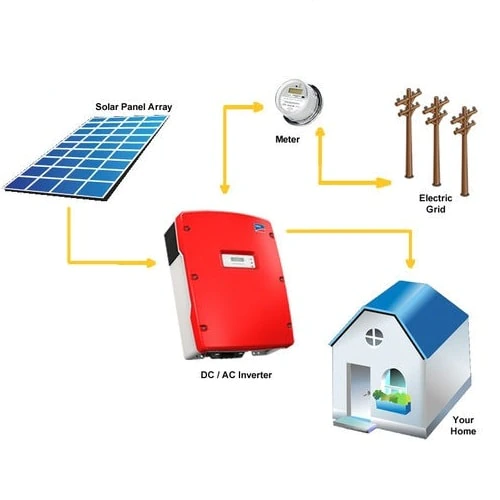Many inverters are designed specifically for off-grid systems, while others will work on either on-grid or off-grid systems. For this reason, it’s important to understand how these two types of solar inverters work, and which one you should choose when buying your system. Read on to learn more about the differences between grid-tied and off-grid solar inverters, and see if an off-grid system could be right for you!
On-grid Inverter Advantages
An on grid solar inverter is used when homeowners want to connect their solar panels directly to their local power grid and receive credits for any excess energy they produce. They’re also known as grid-tie inverters. Some advantages are as follows.
- Grid-tie inverters are easy to install and maintain.
- They are affordable in comparison to off-grid inverter systems, as homeowners don’t have to purchase batteries or storage devices for their solar panels, which can get expensive.
- They are easy to use, as homeowners don’t have to think about storing excess energy for later use. It can be used immediately or sold back to their local power grid for a credit on their electric bill.
- They are great for households that have limited roof space for solar panels, as they don’t require any batteries or storage devices to store excess energy for later use.
- They require less maintenance than off-grid inverter systems, as homeowners don’t have to worry about maintaining a battery system for their solar panels.
- You can get electricity from the grid when your solar panels aren’t producing enough energy to meet your household’s needs.
On-grid Inverter Disadvantages
An on-grid inverter is only as good as your home’s electrical grid. If you live in an area with frequent power outages, an on-grid inverter might not be for you. It also can’t store any energy generated by your solar panels and doesn’t require a battery backup system to function during extended blackouts. Additionally, if your utility company raises rates or lowers credit thresholds while you have an on-grid inverter installed, you could end up paying more than expected.
Advantages of off-grid Inverters
An off grid inverter is a device that uses a separate battery backup system to supply power to your home or business in case of an outage. Some of its advantages are as follows.
- It can be used in places where there is no access to electricity networks like remote areas and islands.
- They are capable of reducing electricity costs as they can be used to generate power from renewable sources such as solar and wind energy.
- They are not dependent on electricity from power companies and hence can be used in places where there is no power supply.
- Makes you completely energy independent, meaning that you are not reliant on electricity from power companies for your day-to-day needs.
- They can be used in conjunction with solar panels and wind turbines to generate electricity in a cost-effective manner.
- They provide handsome power backup in case of an outage.
- They can be used to store electricity generated during off-peak hours and use it during peak hours when electricity is expensive, thus saving you money on your electricity bills.
Disadvantages of off-grid system design with battery storage
With off-grid systems, you’re responsible for power generation and storage. This means that if your solar panels aren’t able to generate enough electricity during daylight hours, you won’t have any backup power. And while battery storage is a viable option, it can be expensive and requires regular maintenance. So, unless you live in an area with consistent sunlight throughout most of the year, an off-grid system may not be ideal. While off-grid systems are great for some people and situations, on-grid systems tend to be much more popular.

